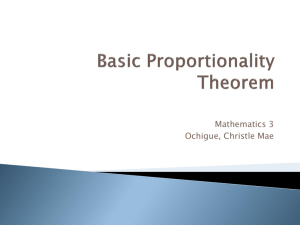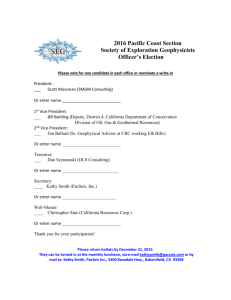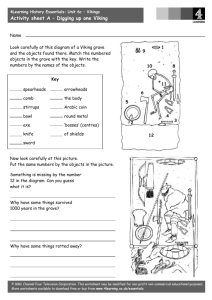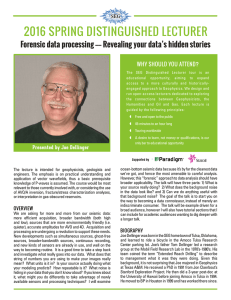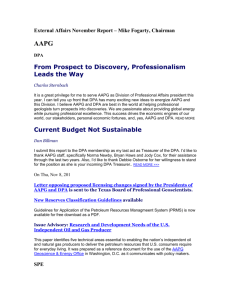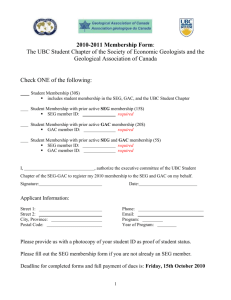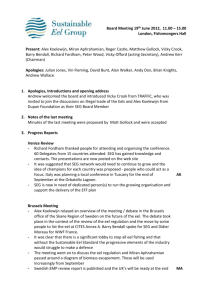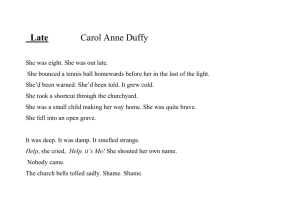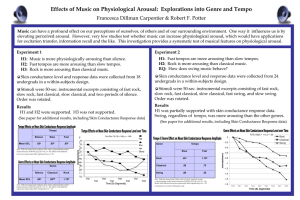Excerpts from Princess
advertisement
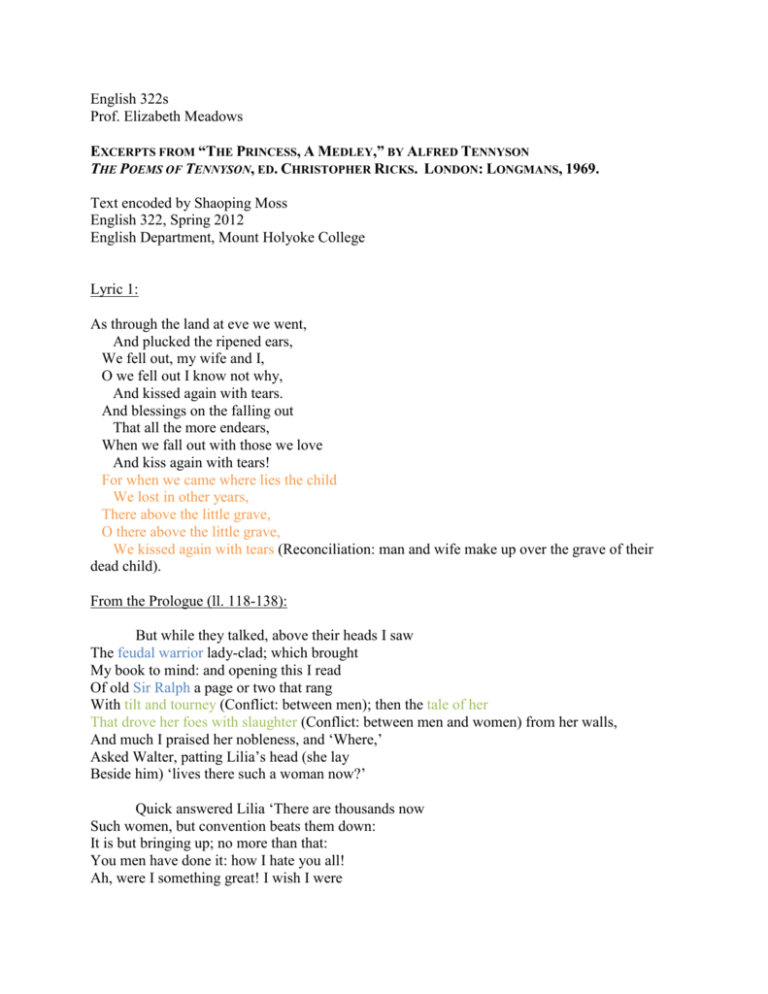
English 322s Prof. Elizabeth Meadows EXCERPTS FROM “THE PRINCESS, A MEDLEY,” BY ALFRED TENNYSON THE POEMS OF TENNYSON, ED. CHRISTOPHER RICKS. LONDON: LONGMANS, 1969. Text encoded by Shaoping Moss English 322, Spring 2012 English Department, Mount Holyoke College Lyric 1: As through the land at eve we went, And plucked the ripened ears, We fell out, my wife and I, O we fell out I know not why, And kissed again with tears. And blessings on the falling out That all the more endears, When we fall out with those we love And kiss again with tears! For when we came where lies the child We lost in other years, There above the little grave, O there above the little grave, We kissed again with tears (Reconciliation: man and wife make up over the grave of their dead child). From the Prologue (ll. 118-138): But while they talked, above their heads I saw The feudal warrior lady-clad; which brought My book to mind: and opening this I read Of old Sir Ralph a page or two that rang With tilt and tourney (Conflict: between men); then the tale of her That drove her foes with slaughter (Conflict: between men and women) from her walls, And much I praised her nobleness, and ‘Where,’ Asked Walter, patting Lilia’s head (she lay Beside him) ‘lives there such a woman now?’ Quick answered Lilia ‘There are thousands now Such women, but convention beats them down: It is but bringing up; no more than that: You men have done it: how I hate you all! Ah, were I something great! I wish I were Some mighty poetess, would I shame you then, That love to keep us children! Oh I wish That I were some great princess, I would build Far off from men a college like a man’s, And I would teach them all that men are taught; We are twice as quick!’ And here she shook aside The hand that played the patron with her curls. From Book I (ll. 125-142): ‘I would you had her, Prince, with all my heart, With my full heart: but there were widows here, Two widows, Lady Psyche, Lady Blanche; They fed her theories, in and out of place Maintaining that with equal husbandry The woman were an equal to the man. They harped on this; with this our banquets rang; Our dances broke and buzzed in knots of talk; Nothing but this; my very ears were hot To hear them: knowledge, so my daughter held, Was all in all: they had but been, she thought, As children; they must lose the child, assume The woman: (Women’s status: inferior to men. To escape this oppressive relation, women must give up being or having children) then, Sir, awful odes she wrote, Too awful, sure, for what they treated of, But all she is and does is awful; odes About this losing of the child; and rhymes And dismal lyrics, prophesying change…’ From Book III (ll. 272-280): She bowed as if to veil a noble tear; And up we came to where the river sloped To plunge in cataract, shattering on black blocks A breadth of thunder. O’er it shook the woods, And danced the colour, and, below, stuck out The bones of some vast bulk that lived and roared Before man was. (Distant past: Here Princess Ida imagines a prehistory without gender conflict. ) She gazed awhile and said, ‘As these rude bones to us, are we to her That will be.’ (Reconciliation: the distant future implied here replaces the image of the child as a symbol of reconciliation.) From Book VI (ll. 172-189): At first her eye with slow dilation rolled Dry flame, she listening; after sank and sank And, into mournful twilight mellowing, dwelt Full on the child; she took it: ‘Pretty bud! Lily of the vale! half opened bell of the woods! Sole comfort of my dark hour, when a world Of traitorous friend and broken system made No purple in the distance, mystery, Pledge of a love not to be mine, farewell; These men are hard upon us as of old, We two must part: and yet how fain was I To dream thy cause embraced in mine, to think I might be something to thee, when I felt Thy helpless warmth about my barren breast In the dead prime: but may thy mother prove As true to thee as false, false, false to me! And, if thou needs must bear the yoke, I wish it Gentle as freedom’… From the Conclusion (ll. 72-79): ‘Have patience,' I replied, 'ourselves are full Of social wrong; and maybe wildest dreams Are but the needful preludes of the truth: For me, the genial day, the happy crowd, The sport half-science, fill me with a faith. This fine old world of ours is but a child Yet in the go-cart. Patience! Give it time To learn its limbs: there is a hand that guides.’ ==================== I need you to help me with the description for the feudal warrior and Sir Ralph that indicate distant past. I’ve used red color for women’s status since it’s harder to distinguish the black from dark brown. In the first excerpt the last few lines are about “Reconciliation: man and wife make up over the grave of their dead child.” I found it violating the TEI rule if I used the tag <seg></seg> to make up several lines of the text, which are encoded with <l></l>. So I used <seg></seg> to mark up single word and phrases, no paragaphs. I also need you to write a note for the reconciliation (orange color) I also discover that I could not use <q></q> to mark up quotations for the same reason that they include several lines. So I decided that the students will not encode the quotations. Was all in all: they had but been, she thought, As children; they must lose the child, assume The woman: (Women’s status: inferior to men. To escape this oppressive relation, women must give up being or having children) then, Sir, awful odes she wrote, quotation cannot be added because they are cross many lines. <lg> <l> Quick answered Lilia ‘There are thousands now</l> <l> Such women, but convention beats them down:</l> <l> It is but bringing up; no more than that:</l> <l>You men have done it: how I hate you all!</l> <l>Ah, were I something great! I wish I were</l> <l>Some mighty poetess, would I shame you then,</l> <l> That love to keep us <seg ana="women_status">children!<note>Women’s status: inferior to men</note></seg> Oh I wish</l> <l> That I were some great princess, I would build</l> <l>Far off from men a college like a man’s,</l> <l>And I would teach them all that men are taught;</l> <l>We are twice as quick!’ And here she shook aside</l> <l>The hand that played the patron with her curls.</l> </lg>
